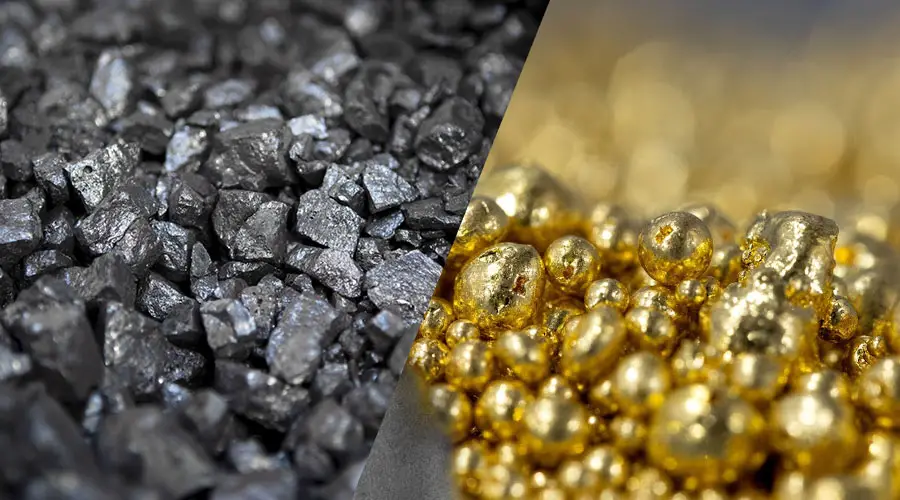The ancient practice of alchemy is shrouded in mystery, however the goals of the practice are well known. In fact, alchemists have three specific goals in mind when practicing their craft.
The 3 goals of alchemy are to turn lead and copper into silver and gold, to find the Philosopher’s Stone – a magical substance required to perform their alchemical transmutations, and to produce the Elixir of Life, a magical substance which cures all disease, reverses aging, and grants immortality.
The practice of working to attain these 3 goals is called the Magnum Opus, and has been practiced by many of the most important scientists, artists, and religious figures of all time.
Goal 1: To turn base metals into noble metals
When alchemists are doing their work, they are primarily focused on turning base metals such as lead, nickel, and copper, into noble metals such as silver and gold. Inspired by the alchemical texts by Hermes Trismegistus and later author alchemical writers, they use a series of techniques that separate physical substances into their primary components. In alchemy it is believed that by recombining the primary components of metals, they can change one metal into another, because they are simply different ratios of the primary components, which alchemists view as being earth, water, air, and fire. You can read more about Hermes Trismegistus here
In addition to silver and metal, alchemy is believed to be able to produce new and previously unknown metal alloys and physical substances. It is rumored that the Emerald Tablet, the legendary text in which Hermes Trismegistus revealed so much to the world about alchemical knowledge, was carved on a bright emerald tablet, made out of a magical alchemical substance which is impossible to destroy. Read more about the Emerald Tablet here.

While officially no one has ever successfully turned lead into gold, also known as transmutation, modern science actually has. Well sort of. Using a process called Nuclear Transmutation, Lead can be turned into gold using a particle accelerator. However, it only produces an insignificant amount. The process involves colliding lead atoms with neutrons in order to knock off protons and form a gold atom.
Despite the widely regarded fact that there is no evidence to prove alchemy is possible, some believe that alchemists have found success at times in history. In order for alchemists to successfully change, or transmute one metal into another, they need a mysterious substance called the Philosopher’s Stone.
Goal 2: Discover the Philosopher’s Stone
In order for alchemists to be able to transmute metal, they need to create the Philosopher’s Stone, a magical substance created only by distilling and combining the exact combination of material substances. Described as a tincture or powder, some have suggested that it is found in a common substance. Read more about the Philosopher’s Stone here.
A common process used in alchemy is placing substances into a pear-shaped glass jar, which they call the Vase of Hermes, and applying heat to the substance. Careful observation was placed on the changes of colors, as black coloration indicates death of the old material, white indicates the potential to create silver, and red color indicates the potential to create gold.
To the alchemists there were scientific and religious or philosophical significance to all aspects of their work. Also called the Stone of Knowledge, the Philosopher’s Stone symbolizes perfection and heaven. The Philosophers’ Stone is also required for goal 3, which is to create the Elixir of Life.

Goal 3: Find the Elixir of Life
It is believed that through alchemy a magical substance called the Elixir of Life can be created, which grants rejuvenation, eternal youth, and immortality to those who drink it. Like the Philosopher’s Stone, producing the Elixir of Life is a matter of combining other substances in the correct manner, in a series of processes involving separating substances in the form of vapor, fermenting substances, and more. The Philosopher’s Stone is a critical ingredient, and once discovered leads to the creation of the Elixir of Life, which is a form of gold, safe to drink, called Aurum Potabile.
The Elixir of Life theme found in other forms. For example, it was said that drinking from the Holy Grail grants immortality. Sought after by King Arthur and the Knights of the Round Table, the Holy Grail is also believed to have been drank from by Jesus during the Last Supper. Like the Philosopher’s Stone, rumours abound as to wither it actually exists, and if so, who has knowledge of it. Read more about the Holy Grail here.
The Fountain of Youth another myth which promises immortality. Versions of it are found in various cultures throughout history. The Greek historian Herodotus described it in the 5th century BC. The legend says that there is a spring that restores youth when you bathe in it or drink from it.

Today the field of life extension is a growing and profitable space, with great interest in new breakthroughs. The current maximum lifespan is considered to be 125 years, but stem cell search and gene therapy are pushing the boundaries of what is possible.
By successfully turning lead into gold, the alchemists are discovered the Philosopher’s Stone in the process. While the wealth they can create in this manner is nice, the alchemists are more focused on the other goals, which are much more profound in nature. With the Philosopher’s Stone, immortality can be achieved, and therefor total liberation of the human spirit.
Recommended Reading
If you want to continue exploring this subject more deeply, you can see which books I recommend by clicking here.

